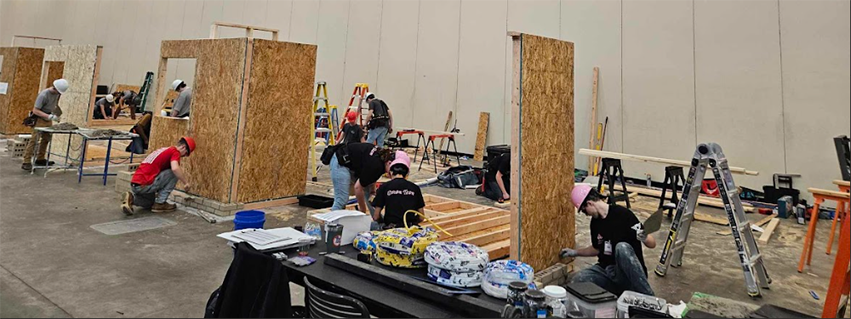
Construction Technology
This program is offered to juniors and seniors and provides an overview of the construction industry by presenting information in several related areas.
Students will begin the program in construction safety then following this introduction, structural framing will be taught. Students will learn to frame residential buildings using various accepted framing techniques. Various types of foundations and the advantages and disadvantages of each are covered. Students will also learn how to install different roofing and siding materials, plus learn to finish the interior of a residential building.
Year 2
This course is offered to seniors that have successfully completed the first year of the program.
Program Overview
Course Information
Program Location
LCC West Campus
Session Offered
AM Only
Average Lecture Days/Week
1-2 days
Average Lab Days/Week
3-4 days
Homework
Weekly
Required Reading
- College level textbooks and workbooks
- Less than 10 pages/week
Success Indicators
- Safety conscious
- Strong eye/hand coordination
- Focused
- Attentive
- Willing to follow directions
- Enthusiastic
- Motivated
- Good attitude
- Good work ethic
- Desire to learn
College Credits - 14
- DCTM 102 - Construction Safety
- BLDT 120 - Structural Framing
- BLDT 130 - Building Exterior Construction
- BLDT 140 - Building Interior Construction
Academic Rigor
3 out of 5
Capital Region Technical Early College (CRTEC)
Students enrolled in this program may choose to participate in the Capital Region Technical Early College program. This is a high school-to-college program where students start in grade 11 and end their 13th year with a degree or certification. This program gives students relevant career related experiences.
Course Outcomes
Students Learning Outcomes include but are not limited to:
- Describe the scope and application of OSHA Regulations as it applies to construction worksites
- Describe the importance and use of personal protective equipment and practices
- Explain and demonstrate material handling
- Explain and demonstrate the safe use of hand tools and small power tools
- Demonstrate knowledge of basic first aid
- Analyze various products, components and building materials.
- Determine where they will be used
- Read blueprints using standard symbols and abbreviations
- Identify and describe the various types of foundations
- Identify and install various types of floor systems
- Layout and assemble exterior and interior wall systems
- Identify and install various types of roofing systems and materials
- Plan, schedule, and estimate costs for multiple components of construction
- Identify and install various exterior finish materials - vinyl siding, composite board and asphalt shingles
- Design and construct exterior decks
- Identify/install/apply different types of insulation
- Identify/install/finish drywall to walls and ceilings
- Identify and install various types of interior doors
- Identify and install various types of flooring
- Identify and install millwork
Certifications
- Home Builders Association of Michigan
- CPR
- OSHA - 10
Student Leadership
Students have the opportunity for leadership, competition and community service through membership in SkillsUSA.
Career Outlook
Careers
- Laborer
- Surveyor
- HVAC Installer
- Electrician
- Floor Layer
Median Wage
- Laborer: $21.78 Hourly, $45,300 Annually
- Surveyor: $32.95 Hourly, $68,540 Annually
- HVAC Installer: $27.55 Hourly, $57,300 Annually
- Electrician: $29.61 Hourly, $61,590 Annually
- Floor Layer: $23.48 Hourly, $48,840 Annually
Employment Outlook (Average)
- Laborer: 2-4%
- Surveyor: 5-8%
- HVAC Installer: 5-8%
- Electrician: 5-8%
- Floor Layer: 5-8%

